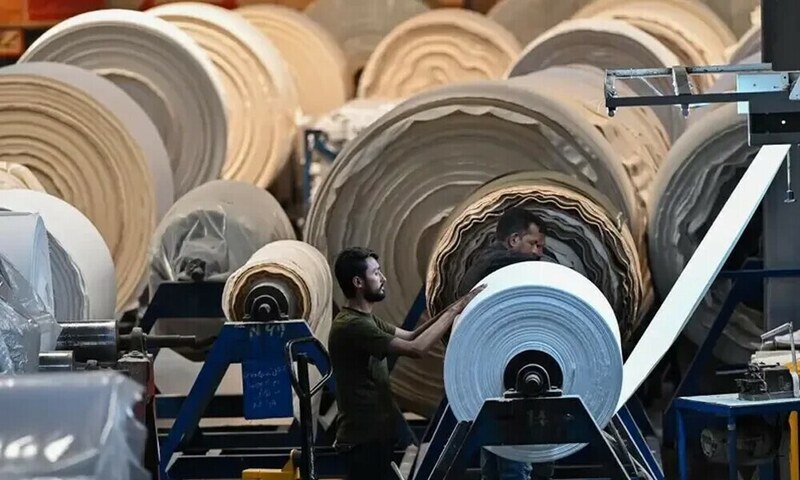Copyright brecorder

ISLAMABAD: Pakistan’s textile industry has urged the government to introduce a DLTL-style rebate mechanism to refund non-export-related levies, recalculate the gas levy on captive power plants (CPPs), and remove the 800 MW cap on electricity purchases under the Competitive Trading Bilateral Contract Market (CTBCM) framework. These proposals were submitted by the All Pakistan Textile Mills Association (APTMA) and the Pakistan Textile Exporters Association (PTEA) during a recent interaction with top government officials. Following this engagement, the Prime Minister constituted eight working groups to develop recommendations aimed at addressing the issues raised by the business community. APTMA and PTEA recommended Introduction of a DLTL-style rebate mechanism to refund non-export-related levies and institutionalize periodic review of export taxation. With 63pc of Pakistan’s overall exports: Textile sector stays dominant contributor On electricity issues, it was proposed that wheeling charge (Rs. 12.55/kwh) is inflated by legacy costs (cross subsidies and DSS), making CTBCM unviable. Hybrid consumption is penalized by charging at the grid’s marginal rate, pushing blended tariffs above standard grid tariffs. The 800 MW cap further restricts participation. APTMA and PTEA further suggested removal of legacy costs from the wheeling charge, allow hybrid consumption at normal grid tariff, and raise the CTBCM cap to 1,500 MW. And further argued that the grid transition levy has disproportionately penalized high-efficiency combined heat and power (CHP) plants, which achieve 60-85% efficiency by utilizing waste heat for industrial processes. Investments in CHP are undermined by an unaffordable and unreliable grid, threatening both exports and sustainability gains. Textile sector recommended the government reclassifies CHP plants under the industrial gas tariff category, subject to a 60% efficiency benchmark and annual third-party audits as well as price supply at actual cost of RLNG, without any subsidies from the government. “The levy on captive power gas use is inflated by reliance on the peak hours’ tariff, outdated O&M costs, and inclusion of DSS. Correct calculation yields a negative adjustment as captive generation is already more expensive than grid at Rs. 3,500/MMBtu gas/RLNG tariff,” the sources quoted textile sector as saying. They recommended the government to recalculate the levy using weighted average 83 tariffs, updated O&M costs, and correct methodology, in synch with the law. On mandatory traceability across the textile value chain, industry stated that the EU Digital Product Passport requirement begins in2027 and suggested mandating full value chain traceability for textile exports, integrating DPPs into export documentation, and fast-tracking development of a unified traceability platform under the National Compliance Centre (NCC). Talking about export facilitation measures, the sector representatives suggested Industrial and Export Processing Zones (EPZs) for 1000 Garment Plants, working capital financing for exports, promotion and incentivization MMF-based export. Fiscal incentives for export diversification and expansion of targeted tax holidays and DLTL rebates for new products, markets, and MMF-based investments were suggested as they would spur diversification and attract fresh capital, adding $3-5 billion in incremental exports within three years. Sialkot Chamber of Commerce and Industry (SCCI) recommended that the government may offer relief for flood affected exporters by waiving off customs duties and taxes on damaged materials and restoring their EFS limits to prevent penalization for force majeure circumstances. It was also requested that the Federal Board of Revenue should facilitate automatic, real-time adjustment of export limits. The Punjab government has already released PKR 3,168.953 million for University of Applied Engineering and Emerging Technologies (UAEET-Sialkot) to IDAP, while the federal government’s committed share of PKR 2,542.021 million release remains pending. Minister’s support was requested for the release of the federal government’s share to ensure timely completion of the project. The Sports Industries Development Centre (SIDC) and Sialkot Business & Commerce Centre (SBCC) were jointly conceived and executed by SCCI and SMEDA to support industrial development. Both projects, however, failed to achieve their original objectives due to limited participation of SCCI and excessive administrative control by SMEDA. The government was requested to ensure SCCI’s inclusion in key decision-making roles of such collaborative projects to maintain alignment with their originally conceived objectives and industry needs. Lahore Chamber of Commerce and Industry (LCCI) suggested electricity tariffs, gas tariffs, customs/regulatory duties, and the policy rate be brought down in line with regional economies. “Reduction of discretionary powers of the FBR officials. Clauses such as Section 40B be eliminated to prevent misuse and harassment and digitization and data-driven monitoring systems be focused,” LCCI urged. On the expansion of the tax base and rationalization of tax base, LCCI proposed introduction of FTR for small retailers through consultation with Chambers of Commerce. Database like electricity/gas bills, vehicle registration, bank accounts and property transactions, etc, to be utilised. Agriculture tax system needs improvement (24Yo GDP tax share very low) and urged public awareness initiatives to inform non-filers about benefits of becoming filers. Gujrat Chamber of Commerce and Industry (GCCI): The Chamber raised the issue of pottery industry tax issues, saying industry is paying tax per MMBTU on gas, which is formally reflected in their tax documentation. Furthermore, the Chamber suggested a separate slot should be provided in tax portal to record tax payment, ensuring transparency and ease of compliance for industry, and its ratio be fixed. GCCI retrospective billing was imposed on industries in Gujrat, although implementation of retrospective billing has been deferred, but bills have been issued to industry, so it requested that, until a final decision is made, relaxation should be given to industry in paying bills. An unauthorized inter-provincial ban has been imposed on the export of wheat, despite no such restriction being officially declared, and recommended that the restriction be immediately removed to ensure smooth interprovincial trade. GCCI also sought support in the approval of the Pakistan Pottery Makers Association’s proposal submitted under the Export Development Fund (EDF). Copyright Business Recorder, 2025



